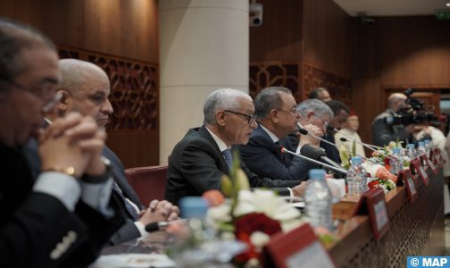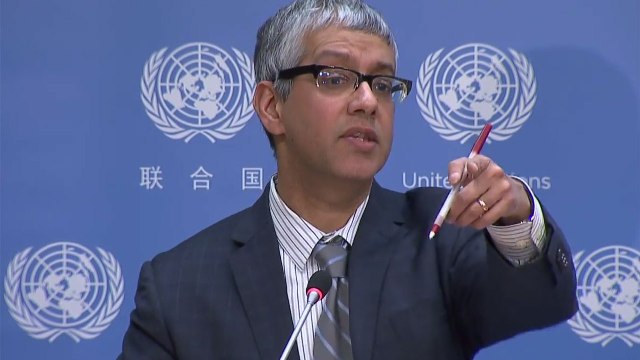Morocco’s Parliament has reiterated its condemnation of the ongoing maneuvers and smear campaigns staged by the European Parliament (EP) against the Kingdom’s territorial integrity and interference in its judiciary system.
This came during a conference-debate hosted by the two chambers of the Moroccan parliament Wednesday to discuss the hostile campaign led by some members of the European Parliament against Morocco. Lawmakers, lawyers, analysts and representatives of civil society who took part in the conference examined the basis of the methodical attacks and misleading accusations made by the EP against the Kingdom in a systematic manner and denounced the European Institution’s hostile, blatant and recurrent attacks against Morocco.
The actions of some parties in the European Parliament against Morocco constitute an interference in the internal affairs of states, said Speaker of the House of Representatives Rachid Talbi Alami in opening remarks.
“This interference is not based on principles or values, but is motivated by cyclical interests and led by lobbies that are more active with the rise in energy prices,” he said.
The campaign “is targeting our international positioning,” Alami said, referring to Morocco’s diplomatic gains over the past decade, including its growing strategic primacy in Africa and the increasingly irreversible pro-Morocco momentum on the Sahara issue.
Morocco is a country where the rule of law prevails and is a democratic, institutionally democratic country that organizes transparent elections, Alami said, adding that the allegations underpinning the EU Parliament’s case against Morocco lack substance and are politically motivated.
The Speaker reiterated condemnation of the EP’s undermining of the Moroccan judiciary, referring to the EU body’s accusations targeting Moroccan courts’ decision to sentence some journalists charged for sexual misbehavior.
The attitude of a political current within the EP is contrary to the relations between Morocco and the EU, the Kingdom’s advanced status with the Union and all the positions and statements of European officials, he stated further.
This action is also contrary to the spirit of the Morocco-EU partnership, a partnership on strategic issues for the future of the region and the world, including the fight against terrorism, migration management, climate change, peace… in which Morocco assumes great responsibilities, he added.
He recalled that the House of Representatives is linked by an EU-funded institutional twinning project with seven European parliaments, noting that this is the second twinning project funded by the EU as a sign of consideration for Moroccan democracy after a first project that linked the House with five European parliaments.
“It is a question of playing with the destiny of countries and indulging in childish behavior,” he stressed, noting that partnership relations must be based on clarity, trust and mutual respect and not on patronage and contempt and denigration of partner institutions.
Echoing Talbi Alami, Vice-president of the Upper House Fouad El Kadiri reiterated the Moroccan parliament’s condemnation of the EP’s allegations against Morocco as “blatant” and “unfounded”.
Morocco’s relationship with the European Parliament was “never stable,” Kadiri said, emphasizing the presence of “up and down” ties that “could explode anytime.” He concluded: “Nothing can guarantee that it won’t explode anytime.”
Ibrahim Rachidi, lawyer and legal expert, agrees that Morocco’s growing assertiveness and its numerous diplomatic gains over the years have contributed to making the country a target to hostile campaigns aimed at smearing the country and its institutions.
“Our country reached many milestones thanks to the royal diplomacy,” he said, recalling the growing number of African countries supporting Morocco’s stance on the Sahara as well as the US recognition of Morocco’s territorial integrity and sovereignty over its southern provinces.
Chairman of the Morocco-European Union Joint Parliamentary Committee, Lahcen Haddad, commented on the EP’s hostile campaign, stressing that the Kingdom’s problem is not with the European Union or its various institutions.
“We continue to work with these institutionds. Last week there was another resolution about the Sahara population that can benefit from the trade agreement [between Morocco and the EU]. It was a very positive interaction,” he said.
The problem is rather with some MEPs known for their hostility towards Morocco.
These MEPs have taken advantage of the corruption crisis shaking the EP to create a climate of fear within the European legislative institution, pushing it to undermine Morocco’s image and reputation in the media and to adopt resolutions hostile to the Kingdom, he said.
Haddad noted that 112 anti-Morocco issues and 18 attempted amendments were raised in the EP in 2022, claiming the existence of a “systematic war” against the Kingdom.
The Moroccan Parliament announced on January 23, in a joint statement issued by its two chambers, its decision to reconsider its relations with the European Parliament and to subject them to a global reassessment in order to take firm and appropriate decisions in light of the European Parliament’s recent positions on Morocco.



